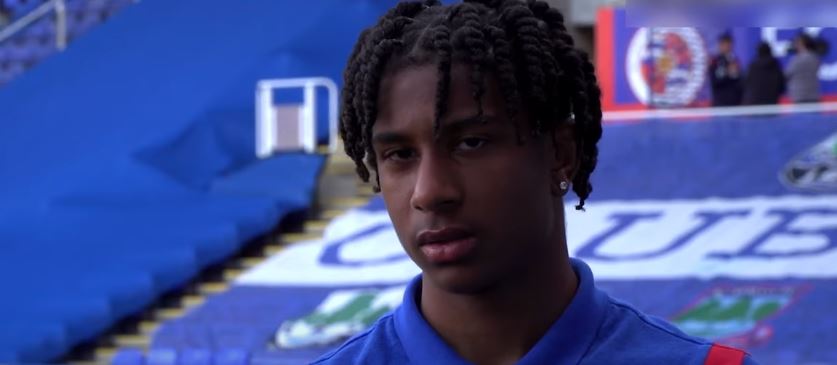In addition to his athletic prowess, Michael Olise’s ascent through the ranks of elite football is the result of an incredibly thoughtful upbringing influenced by two subtly powerful parents. Born to a French-Algerian mother, Mrs. Olise, and a Nigerian father, Vincent Olise, in Hammersmith, London, Michael inherited more than just a multicultural identity. He was born with a compass—a sense of direction derived from cultures that, while different, coexisted peacefully in his household.
His parents gave him options rather than forcing him into a single identity. Each heritage provided a unique perspective: English opportunity, French structure, Algerian flair, and Nigerian tenacity. His rare ability to adapt both on and off the field with remarkable ease was a result of their remarkably successful decision to raise him with exposure to all four. The Olise household was multifaceted, not just multilingual.
| Michael Olise: Personal and Professional Profile | |
|---|---|
| Full Name | Michael Akpovie Olise |
| Date of Birth | December 12, 2001 |
| Place of Birth | Hammersmith, London, England |
| Father | Vincent Olise (Nigerian) |
| Mother | Mrs. Olise (French-Algerian) |
| Nationality | British, Nigerian, French |
| Current Club | Bayern Munich |
| International Team | France |
| Younger Brother | Richard Olise (Chelsea Academy) |
| Previous Clubs | Crystal Palace, Reading |
| Official Source | Wikipedia |
Michael has been quietly adamant in recent interviews about picking France over Algeria, Nigeria, or England. He was very explicit when he said, “My mother is from France. I came here when I was a child. I was connected to this. There was more to that connection than just geography. It was sentimental. It was family. And it lasted long enough to convince one of the most desirable dual-nationals in football to pledge his future to Les Bleus.
It was not a decision made in a vacuum. Parents who prioritized identity over duty fostered it. They enabled him to make a meaningful decision by providing him with exposure, time, and space. It’s a parenting technique that’s becoming more and more common in professional sports. Consider Alphonso Davies, who rose from refugee origins to international fame thanks to his Liberian parents. Or Giannis Antetokounmpo, whose Greek-Nigerian heritage became more than just a side story; it became a pillar of his brand.

Vincent, Michael’s father, plays a significant role in forming that perspective. Vincent brought with him a particularly resilient philosophy from his upbringing in Nigeria. One that instills perseverance rather than entitlement. One that prioritizes modesty over hyperbole. That same meticulous planning is evident in his son’s strategic moves from Reading to Crystal Palace and then Bayern Munich—deliberate, progressive, and never hurried.
Mrs. Olise, however, added something equally important: a characteristically French focus on elegance, discipline, and craft. Although her influence on Michael’s play style is evident, her presence in his life has been considerably understated in public. His movements demonstrate a refined, almost poetic understanding of space and time, whether he is bending a ball into the top corner or gliding past defenders.
The Olise family developed a thinker rather than just a football player by combining these ideals. A strategist. A young man who knows that creativity and control are key when playing football, just like identity. When Michael scored the first goal for France in a decisive 3–0 victory over the United States during the 2024 Olympics, it wasn’t just a headline; it was a significant event. A personal confirmation of his decision and the cultural context that backed it up.
Notably, his younger brother Richard is now right behind him and is already causing a stir in Chelsea’s academy. This indicates not only individual skill but also an ecosystem—a family structure that is obviously generating excellence on a regular basis. The Olise story is especially helpful for young athletes from diasporic backgrounds. It provides guidance on how to deal with heritage without being constrained by it.
Narratives such as Michael’s are becoming more and more instructive in the context of national team recruitment and youth development. Federations now understand that emotional intelligence and cultural flexibility are just as important as physical prowess in determining talent. In addition to embracing his maternal heritage, Michael’s representation of France has reaffirmed the importance of fluid identity, particularly in a game that is growing more inclusive and globalized with every passing generation.
The Olise family has made an impact through calculated choices without ever speaking out. That upbringing is evident in Michael’s poise both on stage and in interviews. He commands attention rather than seeking it. He communicates precisely without going into too much detail. In contemporary football, where character development is frequently subordinated to brand building, this duality is especially novel.
Michael is expected to develop into a cultural icon as well as a team leader in the upcoming years. His choices have consequences, both on and off the field. The legacy of Vincent and Mrs. Olise will silently follow him as he continues to excel for Bayern Munich and the French national team. Not in Instagram posts or interviews, but in every well-planned run, every instant of composure under duress, and every unexpected film.
